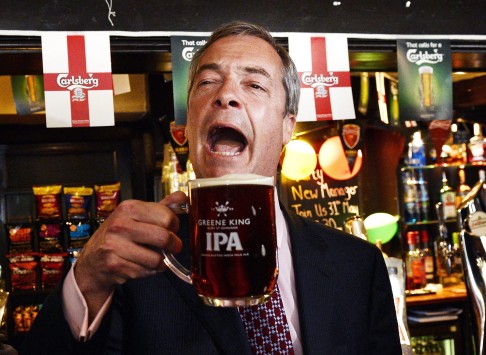Britain’s anti-immigration party UKIP surges in local elections
Britain’s UK Independence Party surged to its best ever performance in local council elections on Friday, boosting the hopes of Nigel Farage’s anti-EU and anti-immigration group for the European parliament polls.
Farage said his party were now “serious players” after taking votes from the three main parties, posing a headache for Prime Minister David Cameron ahead of general elections in May next year.
Elections for some local councils in England and Northern Ireland were held on Thursday alongside the European parliament vote, the results of which will not be announced until Sunday.
“The UKIP fox is in the Westminster hen house,” a beaming Farage said on Friday as the first results came through.
Despite his party having no seats in the British parliament, the beer-swilling, chain-smoking Farage has led UKIP from fringe party to become a standard-bearer for the eurosceptic movement across the continent.
Cameron has promised an in-out referendum on Britain’s membership of the European Union in late 2017, largely to see off the perceived threat of the eurosceptic UKIP on the right.
The UKIP fox is in the Westminster hen house
In results so far from 150 of the 161 councils being contested in England, UKIP had won 157 seats, having previously held just two, although it still does not actually control any city halls.
The centre-left main opposition Labour party led by Ed Miliband were up 292 seats at 1,891, lower than the party had hoped for, while Cameron’s centre-right Conservatives were down 201.
The centrist Liberal Democrats of Deputy Prime Minister Nick Clegg took a pounding, down a massive 284 seats to 404, as a result of the party’s coalition with the Conservatives, unpopular with many of its supporters.
In terms of control of councils, the Conservatives were down 11, Labour up six and the Lib Dems down two.
Turnout was a relatively weak 36 per cent according to initial estimates.
A projected national share of the vote in a Britain-wide election suggested that Labour would have got 31 per cent, ahead of the Conservatives on 29 per cent with UKIP on 17 per cent and the Liberal Democrats on 13 per cent.
Farage will be hoping to win his party’s first seat in the British parliament next year.
“We are serious players,” Farage said on Friday. “Over the course of this summer we will choose our target constituencies and throw the kitchen sink at them.”
Cameron said he still believed the Conservatives could win a majority at the general election but admitted there was voter frustration with the mainstream political parties.
“The economy is growing, we are creating jobs, but we have got to work harder,” he said.
Labour leader Miliband rejected criticism of his leadership style after the party failed to make its expected gains.
“What you are seeing in some parts of the country is people turning to UKIP as an expression of that discontent and that desire for change,” he said.
Despite a disappointing result for fellow eurosceptic populist Geert Wilders’ PVV in the Netherlands, UKIP is hoping to dramatically increase its tally of nine members of the European parliament when results are announced across the EU on Sunday night.
The party has struck a chord with a British electorate that widely views the EU as a meddlesome bureaucracy and fears the impact of mass immigration from the 28-nation bloc.
Farage, a former commodities trader, has in particular set himself up as a plain-speaking alternative to the soundbite-obsessed British political elite.

Comments